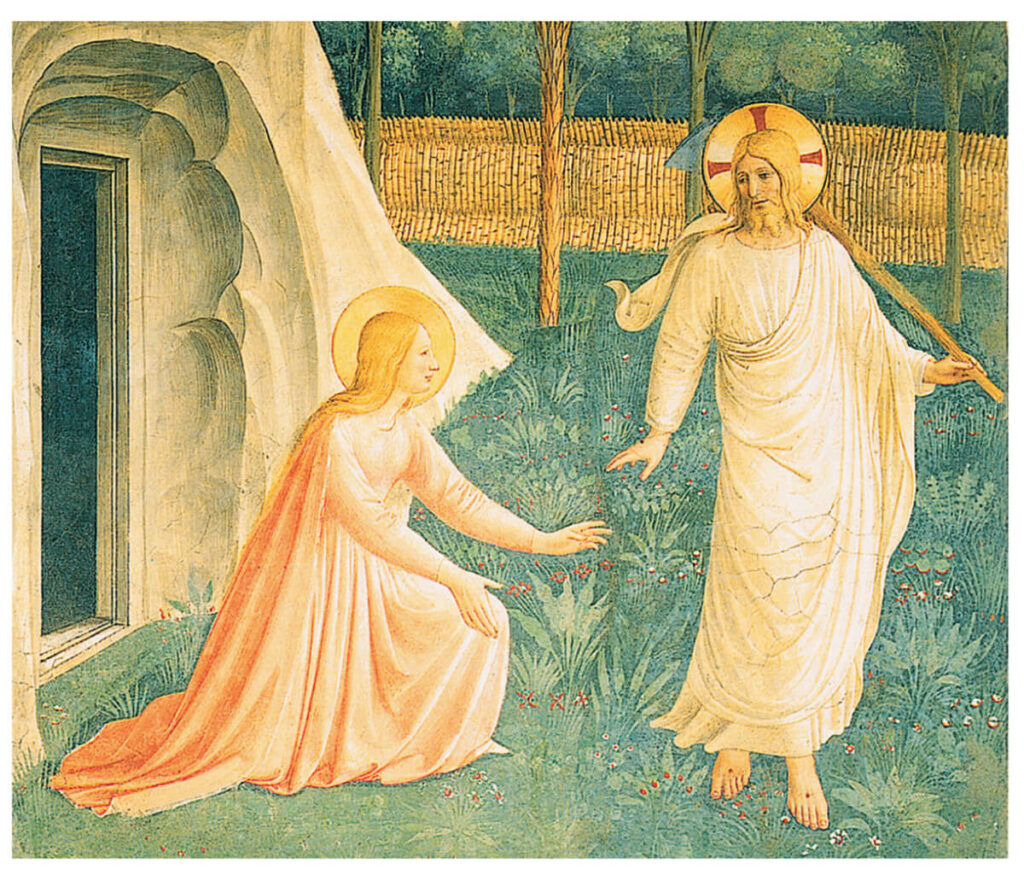There is an apparent tension between Jesus’ words to the brigand, also called a “thief” (though seeing that he was perhaps a Jewish insurrectionist against the Roman Empire, “thief” may not be the strongest word to use for his crimes), on the cross in Luke 23:43, where He says, “Today, you will be with me in paradise,” and His statement to Mary Magdalene in John 20:17, where He says, “Do not hold on to me, for I have not yet ascended to the Father.” These sayings from the Lord can be reconciled by understanding these statements in light of different theological contexts and aspects of Jesus’ salvific work. We can relieve the tension by exploring the concept of paradise and the distinction between Jesus’ death and His Ascension. Let’s explore how these sayings can fit together.
1. Paradise in Luke 23:43:
- When Jesus tells the brigand, “Today, you will be with me in paradise,” the term “paradise” here most likely refers to a state or place of blessedness, often associated with the intermediate state of the righteous before the final resurrection. This interpretation is consistent with the way “paradise” is used in other Jewish writings, where it is seen as a place where the righteous dwell after death but before the final judgment and resurrection. For instance, in the deuterocanonical book of Sirach (46:1), we read, “Let us now praise illustrious men, and our fathers in their generations. The Lord apportioned to them a great honor, and gave them a name to be remembered in all generations. They were at rest in the hands of God.”
- Paradise in this context is not necessarily heaven in the full, post-resurrection sense, but a blessed state of fellowship with God. The “today” indicates an immediate, albeit temporary, entrance into a state of rest with Jesus. This would imply that even though Jesus had not yet undergone the full process of His atoning death, He was still in a position to open the way to God’s presence for those who believe. Thus, Jesus’ words are a declaration of hope for the thief, assuring him of immediate peace with God after his death.
- In light of Jewish eschatological expectations, paradise can also be understood as the restoration or “reopening” of the Garden of Eden—a symbol of the perfect communion between God and humanity before the Fall. In this sense, Jesus’ death, which is the means of salvation, effectively reopens the way to paradise or restores the possibility of eternal life in communion with God. His statement to the thief might be seen as pointing to the reversal of the curse of the Fall that Jesus’ death brings about—undoing the estrangement from God caused by sin.
2. The Ascension and John 20:17:
- In John 20:17, when Jesus tells Mary Magdalene, “Do not hold on to me, for I have not yet ascended to the Father,” He is referring to a different moment in His post-resurrection narrative. The Ascension is a specific, future event where Jesus, after spending forty days with His disciples, will be visibly taken up into heaven and seated at the right hand of the Father (Acts 1:9-11). This ascension signifies the vindication of Jesus as Lord and King, and the completion of His redemptive work.
- Jesus’ statement here refers to His final return to the Father in glory, the completion of His earthly mission. He emphasizes that, at that moment, His work of atonement and reconciliation is not yet fully finished in the sense of His being seated in glory at the right hand of the Father, which will occur at the Ascension. (It is no wonder that the Ascension of Christ is a feast day in the calendar of the Church!) The words “Do not hold on to me” suggest that Mary cannot fully cling to Him in the same way because His mission is not yet complete.
3. Reconciling the Two Passages:
These two passages can be reconciled when we understand that Jesus’ words to the thief in Luke speak to the immediate consequence of His death—the opening of the gates of paradise for the righteous to enter, and the intermediate state where those who die in Christ are with Him in blessedness, even before Christ’s Ascension and the final resurrection of the dead.
- Luke 23:43 (“Today, you will be with me in paradise”) speaks of the thief’s immediate entry into the presence of God—a peace that comes from the atoning death of Christ. It doesn’t imply the complete realization of the new heavens and new earth, but a temporary state of rest in God’s presence, which is consistent with early Christian understandings of what happens immediately after death. This is a restorative paradise—a blessed state where the soul is with Christ but awaiting the final resurrection of the body.
- John 20:17 (“I have not yet ascended to the Father”) reflects the ongoing process of Jesus’ redemptive work, which will culminate in His Ascension and the vindication of His victory over death and sin. While Jesus’ death opened the way to paradise, His Ascension is the final stage of His glorification, marking the point when He fully takes His place at the right hand of the Father. This is a significant theological point: the Ascension is Jesus’ vindication and enthronement as Lord (See Daniel 7 and the ascension of the “son of man” to the throne of the Ancient of Days), whereas His death opened up paradise for the righteous, but there is still more to be fulfilled in His salvific work.
4. Paradise as a Reversal of the Curse and Opening of the Way to God:
- I think the idea of “reopening paradise” or reversing the curse through Jesus’ death is a meaningful interpretation of Luke 23:43. In this sense, paradise represents the restoration of access to God, something that was lost after the Fall. The thief’s entry into paradise indicates that, through Jesus’ death, the way back into communion with God is opened once again.
- However, again, this is not the same as the final realization of heaven or the complete restoration of creation. The final fullness of God’s kingdom, which will come with the resurrection of the body and the new creation, is still to come—something that is more directly tied to the Ascension and the ultimate glorification of Jesus and His followers.
5. Theological Synthesis:
- Luke 23:43 speaks to the immediate entry of the righteous into God’s presence after death, a kind of paradise that is accessible even before the full resurrection of the dead. It marks the beginning of the restoration of God’s original creation—a restoration that Christ’s death initiates but that was completed at His Ascension and will be fully realized by His followers in the final resurrection.
- John 20:17, on the other hand, points to the future, completed aspect of Jesus’ work—His return to the Father in glory, which will vindicate His work and establish the fullness of His reign. The Ascension signals the beginning of the final consummation of the kingdom of God when Jesus took His seat at the Father’s right hand, completing the work of salvation and inaugurating the new heavens and new earth.
Conclusion:
Jesus’ statement to the thief in Luke and His words to Mary Magdalene in John are not contradictory, but rather they point to different aspects of Jesus’ redemptive mission. The words to the thief reflect the immediate hope of paradise—the opening of the way to God through Jesus’ death, while the statement to Mary Magdalene speaks to the future completion of Jesus’ mission—His Ascension and full vindication by the Father. Together, these passages reflect the already-but-not-yet nature of Christian salvation, where believers already experience fellowship with God but await the full realization of God’s kingdom at the final resurrection.

